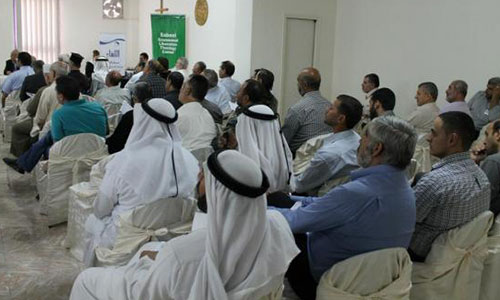
“The Contribution of the Palestinian Curricula to Living Together”
Al-Liqa’ Center and Sabeel Center
Bethlehem Hotel – Bethlehem
11 October 2012
More than 160 people from all sectors of society: religious leaders, lay persons, school principals, teachers, and academics from different areas in Palestine attended this study day which focused on the Palestinian curricula and its contribution to living together.
The program included welcoming remarks by Sawsan Bitar, coordinator of Living Together programs, and by Dr. Geries S. Khoury, Mrs. Hind Khoury, and Archbishop Atallah Hanna.
In the first session, which was moderated by Mrs. Sima al-Ghawali, Muslim speaker Dr. Walid Mustafa presented a PowerPoint presentation about Arab history textbooks used in the 6th to 12th grades. He gave many examples of how these history textbooks could be improved to better inform Muslim understanding of the contribution of Christians throughout Arab history, even in the period before Islam which is often passed over as homogenously ignorant. Christian respondent Dr. Adnan Musallam, thanked Dr. Mustafa wholeheartedly, highly recommending these notes to the administration.
In the second session, moderated by Dr. Iman Sacca, the Christian speaker Prof. Qustandi Shomali presented an examination of the Arabic language textbooks used by the schools. He mentioned that in the Arabic textbooks there is no clarity about the contribution of the Christian poets and writers. He also referred to language lessons in which Christian students have to memorize chapters from the Qur’an while no Biblical passages are used. The Muslim respondent, Dr. ‘Abd al-Rahman ‘Abbad, who supervises Arabic language textbooks, discussed the careful choice of these texts. He explained that the Qur’an is the basis for proper use of the Arabic language and as such must be included in the books. The Bible, on the other hand, was not originally penned in Arabic, nor it is considered the linguistic base.
In the third session, moderated by Mrs. Haneen Abu-Sa’da, Sister Virginie Habib presented a study of texts used for Christian education classes. Sheikh Maher ‘Assaf presented on parallel texts used for Islamic education classes.
At the conclusion of the Study Day, recommendations were put forth:
• To host more study days incorporating more detailed, in-depth study of the curricula and inviting specialists who will better equip participants to suggest alternative strategies for using school curricula to deepen the foundation of living together, national unity, and shared history.
• To invite representatives from the Ministry of Education so that they can listen to suggestions and recommendations.
• To focus on concrete tasks that can be done and to be careful not to be hampered in progress by too much theorizing.
• To discard all texts that accuse others of unbelief, instead utilizing texts that focus on the dignity and freedom of all.
• To allocate one class period per week in all schools for teaching the importance of living together and knowing each other, and for increasing understanding of ethical and moral norms and religious beliefs.


